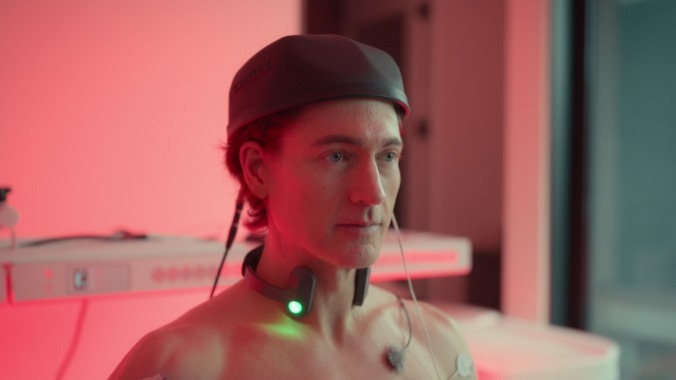Netflix Doc Don’t Die Captures the Ecstasy and Delusion of the Anti-Aging Vanguard

What is the function of physical health? As nebulous a concept as “health” inherently is–because one can always be at least a little “healthier”–what would you say is ultimately the end goal of achieving a top-notch physical state of being? Does one strive to be healthy in order to more fully enjoy or indulge in life’s myriad experiences? Or is the purpose of health simply to prolong life itself at any cost? Are scoring “perfect” biometric numbers their own reward, and how much is it reasonable to expect someone to do in service of making those numbers go up or down as recommended? Especially when the person in question is say, an average American and not a millionaire or billionaire with unlimited resources to devote to the goal? Because if there’s one thing that should be immediately clear to any viewer of new Netflix documentary Don’t Die: The Man Who Wants to Live Forever, it’s that nothing about the case of Bryan Johnson can be construed as conventional or applicable to the average person in almost any way. This is a man whose anti-aging obsession requires both an extraordinarily, frighteningly focused mindset, and the resources of the top .1% of mega-millionaires to turn into a reality. Bryan Johnson is a scenario entirely unto himself.
And that, perhaps unsurprisingly, makes him a fascinating subject for longtime documentarian veteran Chris Smith, the creator of cult-classic American Movie and various, subsequent documentary features and series that have ranged from HBO’s 100 Foot Wave to Netflix’s Fyre and Wham!. With Don’t Die, Smith has clearly humored Johnson’s obvious desire for self-aggrandizing publicity, allowing him to tell the story of his life as he sees it, as Smith simultaneously digs for the motives behind why this 47-year-old man has devoted unimaginable dollar figures to the quest for anti-aging effects that he dreams will give him the “body of an 18 year old.” The director’s personal opinion rarely enters the equation in this fairly neutral look at the controversial figure of Johnson, whose “Project Blueprint” turned into a viral internet story in the last few years, but one gets the sense regardless that Smith is transfixed by the admittedly impressive determination and willpower of the millionaire health obsessive, and simultaneously feels some pity for the way the man has built an artificial temple of “health” around himself, severing his more natural human connections and relationships in the process.
At the very least, there’s no denying that Don’t Die is a story of one man’s absolute, utter obsession with achieving a specific goal: In Johnson’s case, that is to slow the physical aging process as much as it possibly can be slowed, and reverse it anywhere this might theoretically be possible, to achieve the youngest “biological age” that can be achieved. How is this done? Well, it starts in the places one would no doubt expect: Diet, exercise, sleep, etc., before steadily ramping up in more and more absurd directions. Hours of intense gym workouts are somehow fueled by 2,000 vegan calories a day, as Johnson admits on camera that he’s constantly hungry, remarking that “the saddest part of my day is the last bite.” He casually pops 130 pills or more on a daily basis, takes trace levels of various minerals and metals measured in micrograms, and engages in something called “penis shockwave therapy,” a phrase that appears on screen for about half a second and is never (blessedly) mentioned again. What it looks like in practice is the broadest and most all-encompassing approach to health you’ve ever seen: It’s like the teams of doctors at Johnson’s employ are loading anything that anyone has ever postulated might be good for health into a shotgun shell and simply blasting him with it on a daily basis. How anyone could possibly keep track of the interactions of all these drugs and supplements, I have no idea. That point is mentioned but never explored in earnest.
Once one sees how much of Johnson’s waking hours revolves around these health tasks, an obvious question arises: Why does he consider the quest to be worthwhile, given the investment of time, money and other sacrifices? And to even attempt to answer that question, you have to accept the postulate that Smith seems to be advancing: Bryan Johnson’s drive to do this is as sincere as it is deranged. He’s not approaching Project Blueprint as an interest or a hobby; it’s more like a philosophy, personal code or religion. He has used it, in fact, as a way to remove conscious responsibility for himself from his life, what he calls a refutation of the “conscious mind.” The mind, he argues, tricks us into things that aren’t actually good for us. “Demoting” the mind places decision-making not in your own arena, but surrenders those decisions to the body itself.
What does that look like? Well, Johnson doesn’t decide what he wants to eat for his meals, for instance–he allows his heart, liver and lungs to “decide” those things based on what kinds of biometric readings he has and what nutrients they need. He’s effectively ceded all decision making in this way to his own physical shell, which is oddly freeing, in the sense that he presumably doesn’t feel any kind of decision paralysis. He gets to simply do what he’s told, which is a streamlined way to live.
-

-

-

-

-

-

-

-

-

-

-

-

-

-

-

-

-

-

-

-

-

-

-

-

-

-

-

-

-

-

-

-

-

-

-

-

-

-

-

-








































